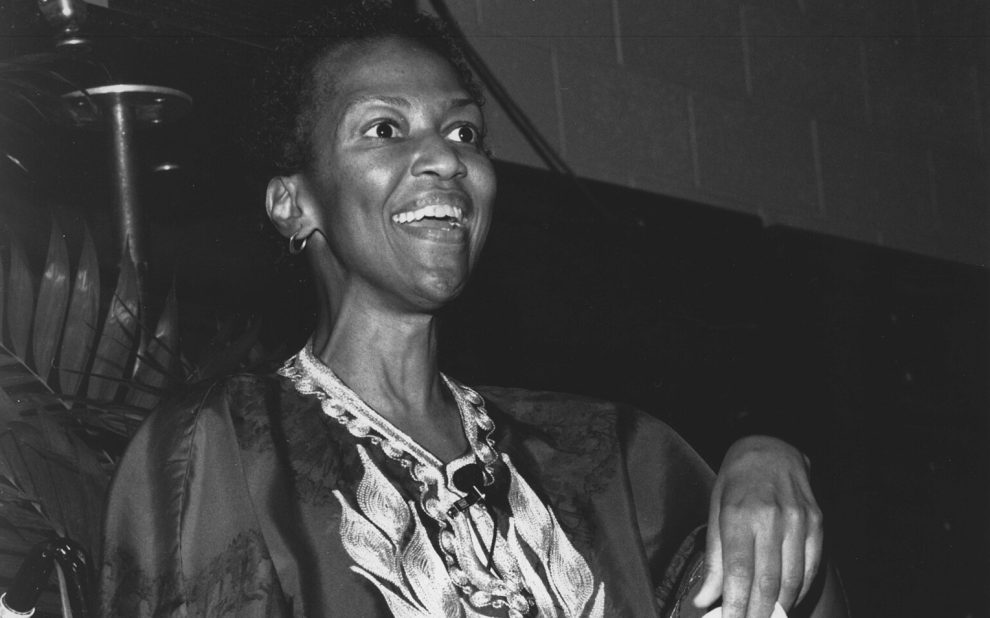“When we know ourselves, we bring the gift of our history and our culture to one another, to the church, and to the world…I investigate and embrace the spiritual and psychological survival skills embodied in my culture.” In these words to the United States bishops in her historic 1988 address, Servant of God Franciscan Sister of Perpetual Adoration Thea Bowman lifted the veil on Black life, revealing how Black people maintained their sanity and sanctity as disenfranchised citizens of this country and members on the periphery of the church.
Today, our nation is marred by division and derision—riven by cruel juxtapositions between subjugation and freedom, wealth and welfare, supremacy and inequality, unfettered privilege and unrelenting violence. The American story is tethered to its fraught violent history of African enslavement, indigenous genocide, and white supremacy. In recent years, the societal and ecclesial landscape of the United States has been disrupted by devastating events.
Both nationally and globally we have witnessed the tragic effects of a wounded world: sickness and death from COVID-19, fear and frustration, political disinformation, the suffering of migrants and refugees seeking asylum at our southern border, ongoing police brutality toward African Americans and Hispanics, an onslaught of anti-Asian hate crimes, immoral voter suppression laws targeting communities of color, and the ever-present reckoning in the quest for racial justice and equity. America has weathered pandemics, war, political violence, political polarization, rebellions, and insurrections before, yet despite calls for justice and harmony, as a nation we continue to devolve into chaos and consternation.
In the face of this violence and division, I often ponder: How would Sister Thea Bowman react to our inability to achieve racial harmony? And more importantly, what wisdom would she offer?
Sister Thea Bowman urged us, in a 1987 address in New Orleans, to remember that “When Jesus is among us, to work among us miracles of transformation and miracles of love, there is no neutral ground. Neutral ground becomes loving ground; holy ground becomes kingdom ground. We are the children of the cosmos, the children of the universe.”
She didn’t equivocate; those committed to racial justice cannot stand on the sidelines of neutrality. Banishing racism demands that we actively and radically confront it whenever and wherever it raises its evil head. Through her teaching, singing, preaching, and witnessing, Sister Thea promoted cultural awareness, inclusivity, and racial reconciliation by creating moments of encounter and interaction.
Bowman believed that ignorance as well as unwillingness to engage in meaningful cultural contact serve to perpetuate racial divisions. This is why she intentionally brought people together so that they could recognize and accept their common humanity and learn to appreciate the uniqueness of their cultural differences. These “cultural encounters” included the sharing of songs, dances, poetry, stories, gestures, foods, folklore, faith practices, customs, and traditions. She desired people to literally enter each other’s world views and experiences.
One never to acquiesce to inferiority or “otherness,” this brilliant, bold, Black vowed religious woman used her rhetorical agency and unbridled tongue to affirm herself and all Black Catholics when she told the U.S. Catholic bishops that she comes to her church fully functioning with gifts of “Black excellence” in intellect, abilities, and spiritual practices to enrich the church. She offered the gift of “herself, her Black self!” Because the beauty of Blackness has not been fully embraced by society or the church but has often been feared and weaponized, she sarcastically asked the bishops, “That doesn’t frighten you, does it?” Aware of the weariness that Black people feel having to daily confront racism, Bowman illustrated yet another survival tool to combat incessant racist rancor: self-affirmation.
Sister Thea Bowman’s anti-racism is an essential guide for justice work today. In a church that has often made Black people feel like “motherless children,” she affirmed our blessing of Blackness, and our myriad gifts that genuinely makes the church truly catholic. Her faith and fortitude continue to inspire those who knew her and those who have come to know about her. Her spiritual accompaniment assures us, even in the face of racism, that “trouble don’t last always.”
Racism exists in the church and society because we have been unable to dismantle or eradicate it. The Catholic Church in the United States’ greatest reckoning has always been, and will continue to be, its relationship to Blackness. Both the church and nation remain unwilling to resolve, make amends, or atone for their history of and contemporary commitment to anti-Black violence; this refusal is rooted in the very core of its national and ecclesial identities. Yes, racism has been condemned in proposed legislation and enacted laws, identified as evil and sinful in several church promulgated pastoral letters—all to no avail.
If we wish to eradicate white supremacy in the church and the world, we must heed Sister Thea Bowman’s witness and her work—those of us who bear the wounds of racism and those who inflict them.
Sister Thea, pray for us! Amen.
Image: WIkimedia Commons/Katie Hutichson (CC BY-SA 4.0)














Add comment